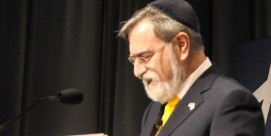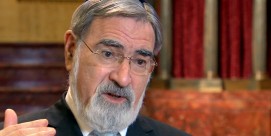Thomas Cushman: Victory over Totalitarianism
President Obama’s speech might have been far more effective—and honest—if he had admitted the most elemental truth about the war in Iraq: that the surge of troops ordered by George W. Bush actually worked to defeat the terrorist insurgency that threatened to derail the whole experiment in liberty and freedom in Iraq.

Obama opposed this troop surge and was, indeed, on the vanguard of the defeatist antiwar left. Had his view prevailed, Iraq would have been reconquered by al-Qaeda and Baathist extremists whose victory over a weak United States would have been the most potent recruiting tool imaginable for America’s enemies for generations to come.
Obama made the political move of declaring the war to be over, but it is not. Fifty thousand American troops remain, and they are combat-ready, and American military presence will always be necessary in Iraq in order to maintain the fragile equilibrium there. The president’s proclivity to announce American withdrawal strategies publicly, not only in Iraq but also in Afghanistan, will only embolden those who wish to derail the most exciting experiment in democracy in the Arab world.
Obama said in a pre-speech press release that he was not going to offer a “victory lap.” Well, why not? That is what US armed forces are entitled to because of their blood, sweat, and tears on behalf of Iraq. Because of their efforts, the insurgency was dealt mortal blows, and now the Iraqi people have an opportunity to make a free and decent democracy in an area that has been characterized by the bloodiest sort of despotism. It was warming that Obama expressed such heartfelt admiration and awe for the troops, but he needed to provide a more affirmative vision of successes in Iraq—a vision that casts it as a victory over totalitarianism, which has always been a central aspect of America’s civilizing mission. It is precisely the renunciation of that mission and Obama’s willingness to appease the new wave of authoritarian leaders around the world that signify the evisceration of a Democratic Party once proud to stand for democratization and human rights in foreign policy.
The speech was disappointing as well in its craven attempt to link the economic crisis of the middle class to the expenditures on the war. Politicizing the war by trying to get the middle class to see its present quandaries as a result of it will not fool the average American, who understands that Obama’s failed economic policies and his drive to increase taxation and social entitlements are, at base, what is making their existence miserable. Obama has been president for nearly two years, and he continues to lay the blame for the economic crisis on his predecessor. He still has not learned the lesson that Americans were only willing to go along with that game for a short time. They elected a president to lead them, not to be a recriminator-in-chief.
It is highly doubtful Obama’s speech will convince the middle classes that the war is the principal reason for their crisis. Such rhetoric appeals to the anti-war left and fulfills a central campaign promise, but that constituency is now a small part of Obama’s political retinue. The November elections will decidedly show that the voters are no longer interested in voting on referenda on the Bush administration and that they expect the president to lead.
Thomas Cushman is professor of sociology at Wellesley College and coeditor of “The Religious in Responses to Mass Atrocity” (Cambridge University Press, 2009).







